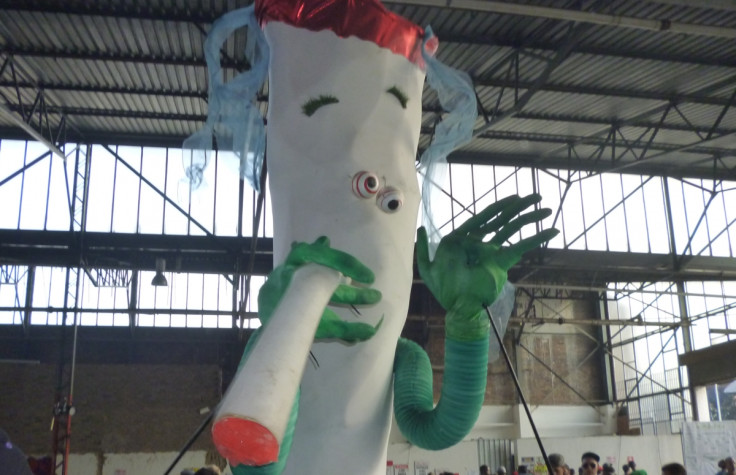My South African Adventure: Get Down With Joburg's D-Day Marijuana Festival

Getting away from it all over the Easter break to have yourself a South African adventure is not exactly the cheapest of propositions.
Hence I decided to stay put, stay local and stay solvent by seeing what delights Jozi had.
And so it was that, on Easter Sunday, I found myself at a Paschal Feast with a difference. No Easter bunnies or Easter egg hunts for me. Oh no.
Instead it was about bearing witness to Joburg's very own 420 festival, dubbed the D-Day Street Party – the D being short for Dagga, the local name for marijuana – in Staib Street, located in downtown, and somewhat dodgy, New Doornfontein.
The festival, which was one of 150 or so taking place around the world this weekend, including Hyde Park in London, saw thousands of pot smokers come together in tribute to all things weed, on what has become a hallowed date in their calendar - 4/20 or 20 April.
Because 420, it turns out, is a commonly-employed codename for the drug, which appears to have been coined by five friends while attending San Rafael High School in California in the early 1970s.
Calling themselves the Waldos because they used to hang out near a wall outside the school, the lads happily came into possession of a map allegedly showing the location of a disused cannabis plant plot in Point Reyes Peninsula.
Keen to get hold of some free bud, they started meeting regularly outside of school at 4.20pm after athletics practice in order to drive off to search for it – but to no avail.
Although the plants remained undiscovered, the spin-off creation of the boys' 420 code word led to a much more famous legacy. Its use was spread far and wide by mutual friends and acquaintances of rock band, the Grateful Dead, from where it was subsequently picked up by the media and went global.
Legalisation
While the US may still be the epicentre of most of the world's 420 celebrations, which generally focus on campaigning for cannabis legalisation, this year was apparently only the second time that South Africa has hosted such an event of its own.
And the driving force behind it all here is the so-called 'Dagga Couple', Myrtle Clarke and her partner, Julian Stobbs, a Brit who has been in the country for 23 years or so.
The whole story started back in August 2010, when the pair's home was raided by the South African Police Service following a tip-off that they were running a drugs lab.
Although no such lab was found, they were arrested for being in possession of more than 105g of cannabis. Despite claiming to be mere recreational users, the quantity involved meant the couple were charged with dealing, before being bailed and released.
After appearing at the local magistrates' court six months later, they duly applied for their case to be heard in the Constitutional Court, the highest in the land. Their aim was to create a test case in order to challenge existing laws prohibiting the use of, and trade in, Dagga, and have them ruled unconstitutional.
While the case is still wending its way through the country's legal system, with all of the fits and starts that implies, it is now expected to be heard in March 2015 – hence the need for events such as the D-Day party, with its R50 (£2.80) entrance fee, to act as a fundraiser.
And an important, although not at first glance obvious, contributor to the campaign will be the Anti-Drug Alliance of South Africa (ADA-SA), a charity set up by former drug addict, Quintin van Kerken, to provide education and support services to substance abusers and their families.
During the event's speeches, which were held just prior to lighting-up time at, you've guessed it, 4.20pm, van Kerken, took to the stage to pledge funding of a massive R500,000 (£28,000) in order to support the couple's legalisation efforts.

Addiction
His argument for the move, when I spoke to him afterwards, was that marijuana was much less harmful than other legal highs such as alcohol and there was no evidence that it led on to harder drug use.
Alcohol, on the other hand, was very problematic, particularly in a heavy-drinking culture such as South Africa, accounting for roughly 20% of all addiction at the national level. Drugs of all types came in next at a further 20%, while the rest comprised a heady mix of prescription medication, gambling, sex and porn.
Moreover, van Kerken elaborated, it wasn't marijuana with its relatively low addiction rates of about 4.5% that were currently causing the biggest drug-related challenges in the country, but rather the amphetamine-like methcathinone or 'cat'. Despite this, cannabis still accounted, bizarrely, for a huge 80% of all police drug investigations, leaving only 20% of already stretched resources for probes elsewhere.
As for more active advantages of legalisation, van Kerken believes that addicts would be more inclined to seek help without fear of recrimination, while cancer, arthritis sufferers and others would be able to exploit the drug's medicinal benefits without fear of legal reprisals.
A third equally important consideration, however, is fiscal. Not only would legalisation take the industry out of the hands of criminal gangs, he said, but the resultant tax revenues from both marijuana and supplementary products such as hemp could be used to fund much-needed health and education programmes, as has happened in the US state of Colorado since it changed its legislation in 2012.
Despite its serious message though, the event itself was actually quite fun. What with indie bands making music, tattooed taggers creating artwork and people dressed as huge spliffs wandering around a large, borrowed 1960s warehouse with merchandise stalls and a bar, it was all very civilised.
And the neighbourhood looks to become even more so as it gets ready to experience a transformation of its own.
Although until recently this particular bit of New Doornfontein was pretty much a no-go area, Propertuity, the developer of the nearby uber-trendy Maboneng Precinct, with its fashionable Sunday Market-on-Main, has now bought up a number of buildings on Staib Street in order to redevelop them and work their regeneration magic there too.
And good luck to them, I say. It seems that this urban renewal bug has really quite addictive qualities of its own.
Cath Everett is a resting journalist who has written about business, technology and HR issues for over 20 years. She recently moved from the UK to South Africa with her husband
© Copyright IBTimes 2025. All rights reserved.






















